Educational Objectives(培养目标)
The journalism and communication master’s program aims in training high-level talents in journalism with an international vision. Students are supposed to be equipped with broad and solid theoretical foundation and be able to conduct independent scientific research. After graduation, they can engage in high-level professional jobs such as journalism and communication research, journalistic practice, teaching in communication departments of higher education institutions, and news media management.
Research Directions(研究方向)
1.Journalism
2.Communication
3.Broadcasting, Television and Digital Media
4.Advertising and Media Economics
Length of Schooling(学习年限)
The study duration for doctoral candidates is 3 years.
Credits Requires(学分要求)
Total credits required for Master degree students:≥36credits, including ≥24credits for degree credits and ≥12 credits for research stage. The specific credits are distributed as follows:
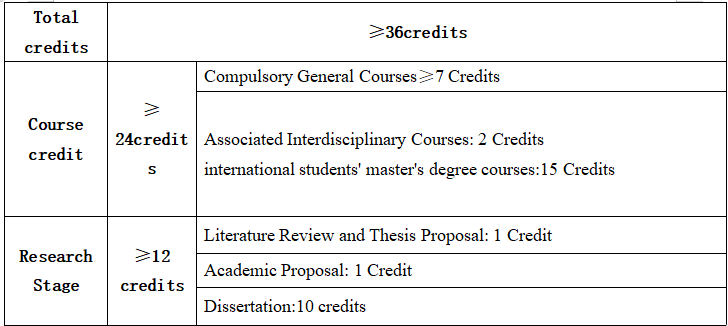
Courses Arrangement and Credit distribution(课程设置及学分分配)
Master’s Courses Arrangement in Journalism and Communication Study
for International Students
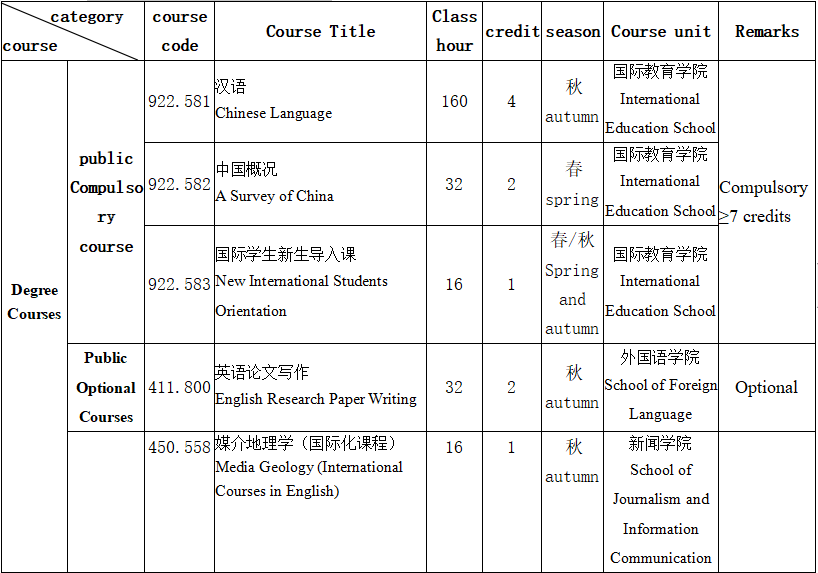
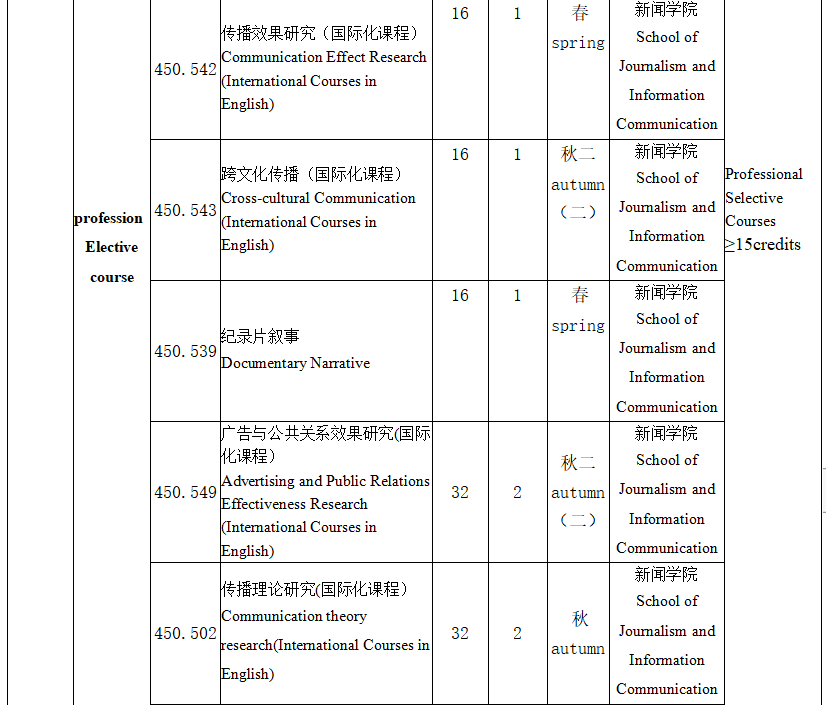

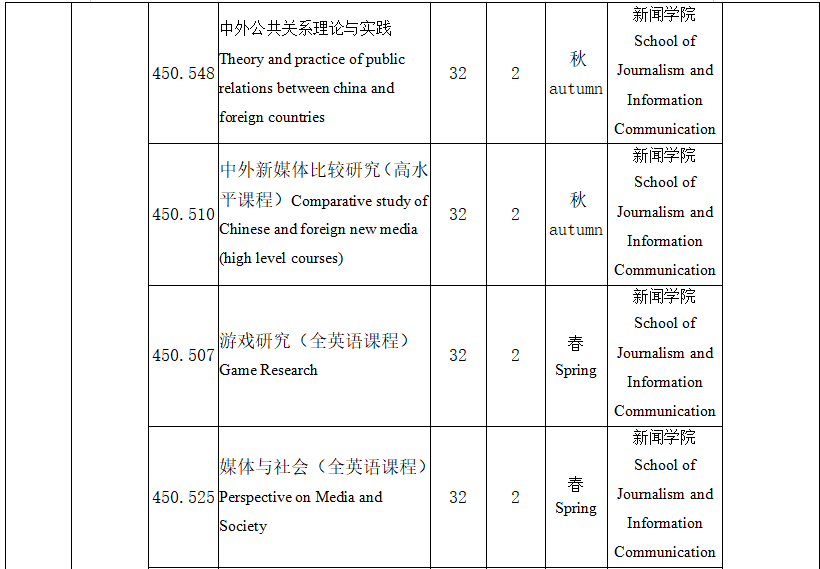
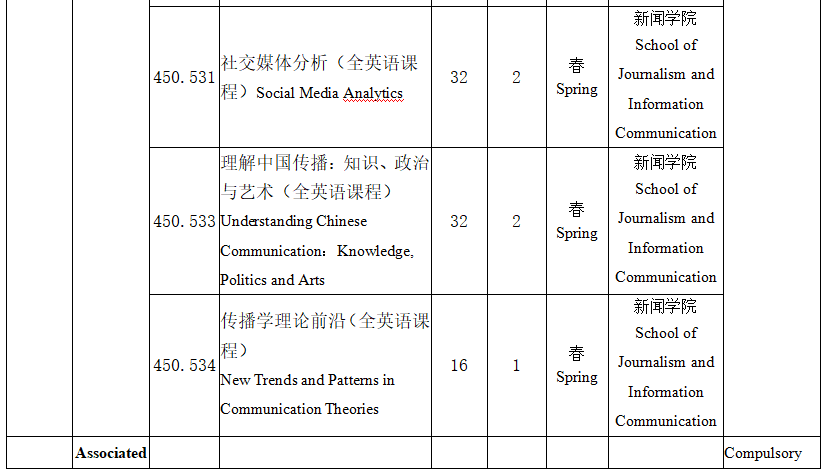
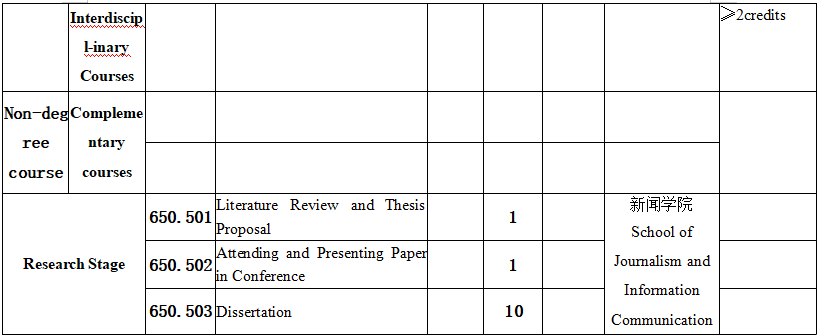
Research stage and dissertations(研究环节与学位论文)
1. Literature Review and Thesis Proposal
Including the amount of literature reading, the time and method of the thesis.
(1) The minimum number of readings in the thesis proposal is 40, of which foreign literature should account for at least one-third. The literature review should present its own research ideas and methods based on the summary and review of other people's research results.
(2) The thesis proposal is generally conducted in the third semester.
(3) The proposal of the thesis should be reviewed and approved by the instructor and the tutor group. In the course of selecting the topic, collecting the materials, writing the abstract, drafting the draft and modifying the thesis, the instructor will give specific guidance. Thesis of master’s degree should be required to achieve the level of academic papers.
2.Middle-term Dissertation Report
Including the mid-term assessment time, form, assessment and diversion methods.
(1) The middle-term dissertation report is generally completed within the third semester of postgraduate entry. Graduate students may apply for extension of the semi-annual period with their own application and the consent of the tutor.
(2) Under the Degree Review Committee of the School of Journalism and Information Communication, the deputy dean of the department will lead the establishment of the post-graduate screening leadership team to organize the mid-term screening of graduate students.
(3) The paper should make an interim report to the steering group in the middle of the paper, report the progress of the paper work, listen to the questions and discuss the improvement opinions, and divide the mid-term screening results into three grades: excellent, qualified and unqualified, which is one of the main conditions for the evaluation of outstanding graduate thesis.
3. Academic report
Including the number of academic reports, assessment methods and specific requirements.
Publish 1 professional academic paper in a publicly published journal; submit a paper to participate in a national academic seminar 1 time; participate in academic activities (lectures, academic salons, etc.) at least 8 times. And actively participate in the scientific research work required by the tutor, complete the scientific research tasks assigned by the tutor.
Academic conferences need to be accompanied by notices of meetings and conference papers, otherwise they will not be recognized.
4. Dissertation
(1) The topic selection of the thesis should belong to the basic research or applied research topic of the relevant research direction of the subject, which has great theoretical significance or application value, and has important academic significance or application value to the development of the discipline or the needs of the country;
(2) The content of the thesis should reflect the author's extensive basic theory and systematic in-depth expertise in journalism, and have a broad understanding of the frontier dynamics and development trends of the research field. The paper should have the author's own creative thinking, and the main research results should be creative;
(3) The thesis should be systematic and complete, with clear expression, rigorous argumentation, accurate and comprehensive citations, and standardized writing.
(4) For graduate students in Chinese, their dissertation should be written in Chinese; for graduate students in English, their dissertation should be written in English, but the abstract of the dissertation must be written in Chinese.
5. Graduation and degree awarding
Graduate students who have completed the learning content stipulated in the training plan and passed the degree defense shall be approved to graduate after being examined and approved by the degree review committee of the school (department). If the degree awarding conditions are met, the degree evaluation committee shall vote to approve the conferment of the master's degree.
Other training links to implement the relevant provisions of the school


 WeChat
WeChat